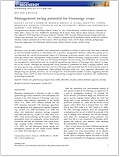| Journal Article |
 |
|
| Article Title | Management swing potential for bioenergy crops | | Author | Sarah C. Davis, Robert M. Boddey, Bruno J. R. Alves, Annette Cowie, Brendan H. George, Stephen Ogle, Pete Smith, Meine van Noordwijk and Mark T. van Wijk | | Year | 2013 | | Journal Title | Global Change Biology Bioenergy | | Institution | John Wiley & Sons | | Pages | 1-16 | | Call Number | JA0479-13 | | Keywords | biofuel, corn, greenhouse gas, legume trees, mallee, Miscanthus, oil palm, soybean biodiesel, sugarcane, Zea mays |
|
| Abstract: |
| Bioenergy crops are often classi?ed (and subsequently regulated) according to species that have been evaluated
as environmentally bene?cial or detrimental, but in practice, management decisions rather than species per se
can determine the overall environmental impact of a bioenergy production system. Here, we review the greenhouse gas balance and ‘management swing potential’ of seven different bioenergy cropping systems in temperate and tropical regions. Prior land use, harvesting techniques, harvest timing, and fertilization are among the
key management considerations that can swing the greenhouse gas balance of bioenergy from positive to negative or the reverse. Although the management swing potential is substantial for many cropping systems, there
are some species (e.g., soybean) that have such low bioenergy yield potentials that the environmental impact is
unlikely to be reversed by management. High-yielding bioenergy crops (e.g., corn, sugarcane, Miscanthus, and
fast-growing tree species), however, can be managed for environmental bene?ts or losses, suggesting that the
bioenergy sector would be better informed by incorporating management-based evaluations into classi?cations
of bioenergy feedstocks. |
|
|
Download file(s): Click icon to download/open file.
|
| |
File Size |
Description |

|
292 KB |
Softcopy |
|
|
|
| Viewed in 2033 times. Downloaded in 774 times. |